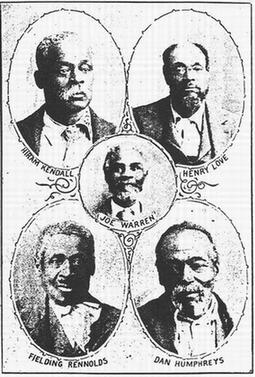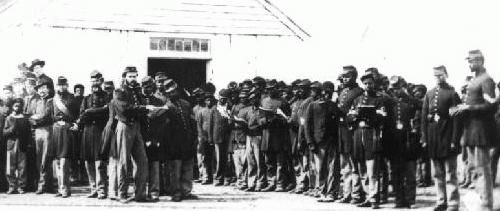In just three days, on April 12, the U.S. will observe the 150th anniversary of the firing on Fort Sumter, considered the start of the Civil War — or War Between the States, take your choice — which tore our country apart from 1861 to 1865. Notice I said “observe,” not “celebrate.” Such a trauma as our Civil War is nothing to be celebrated, even if it did end slavery and keep us one nation.
Whether the war was “all about slavery,” as modern, politically correct historians insist, or whether there were other reasons as well, is something on which there will never be total agreement. Of course slavery was immoral and unjust and unworthy of a great nation, and we were well rid of it. In addition to that, slavery was becoming economically untenable even before 1861; it was a yoke around the neck of the South, which would have ended, sooner or later, one way or the other. Ideological and regional rigidity and resentment led to a settling of the issue in a way that resulted in more than 600,000 American deaths, North and South.
Of the hundreds of thousands of men who fought for the Union, much history-book ink has been invested in telling us how 180,000 or so were black men, how they acquitted themselves well in battle, how they were treated unfairly both by their White Union fellow soldiers and also by the Confederate troops, if they were captured. A picture has emerged over the last century and a half of the two armies: The Union one, mostly White but with a significant black minority; the Confederate force, entirely White except for black slaves who were “body servants,” cooks, drovers, and the like.
I never questioned that picture when I was in school, studying American history. I doubt if one in a hundred of my classmates did, either. But in recent years, more and more evidence has accumulated that has astounded some, and dismayed others: There were Confederate soldiers, weapons-carrying soldiers, who were black — either slaves or “free people of color.” They fought in Southern state militias, sometimes even in regular Confederate regiments, despite a Confederate government official ban on black men being armed that lasted almost the entire war.
Letters and diaries of Confederate soldiers; the same sources from Union soldiers who told of seeing black Confederate soldiers fighting against them alongside the White Rebels; certain statements by Confederate officers, including even generals, about black troops serving under their commands, apparently unbeknownst to the government in Richmond — all these things and others reveal a side to the Civil War that has brought a belated sense of justification to groups like the Sons of Confederate Veterans. They have also outraged, and scared, mainline historians who still subscribe to the “all black people hated slavery” theory canonized by their profession for a century and a half.
Black Confederate soldiers! Black men trusted with guns! Why, that’s an affront to their sense of what the Civil War was all about! Sort of like yelling “NIGGER!” in a crowded Martin Luther King memorial service.
Of course, they all insist, there were no “black Confederate soldiers” as we understand the term, because all black people in the South hated slavery and would have turned guns on their White “masters” if given the opportunity!
When a public school in Virginia was discovered in October 2010 using a history textbook which taught that there were “thousands of black Confederates who fought for the South,” there was much wailing and gnashing of teeth on the part of professional historians and other liberals who insisted that this was a “myth.” The Associated Press report on the incident referred to the textbook “wrongly” claiming the presence of black Confederates, and to the “error,” all without batting an eye. Apparently the reporter took the word of one fourth-grader’s parent, Carol Sheriff, a history professor at the College of William and Mary, that it was untrue, and didn’t bother to check any further. Given the liberal leanings of most reporters and of the AP, that wasn’t surprising.
But the circumstantial evidence supporting the fact of black Confederate troops is strong; the establishment historians’ insisting that it’s a “myth,” is based on shaky ground.
Black conservative columnist Walter E. Williams, a professor of economics at George Mason University, writing in November 2010, quoted from a number of sources from the Civil War era and the lifetime afterward of people who had lived through it, plainly referring to the presence of armed black Confederate troops. Among them:
A Petersburg, Va., newspaper that told of 70 free black men offering to act in “whatever capacity may be assigned to them” in defense of Virginia.
Black historian Charles H. Wesley, writing in “Journal of Negro History” (1919), of “seventy free blacks (enlisting) in the Confederate Army in Lynchburg, Virginia. Sixteen companies (1,600) of free men of color marched through Augusta, Georgia on their way to fight in Virginia.” Possibly the same 70 black men.
Abolitionist and former slave Frederick Douglass, observing with dismay that there were “at the present moment, many colored men in the Confederate Army doing duty not only as cooks, servants and laborers, but as real soldiers, having muskets on their shoulders and bullets in their pockets, ready to shoot down … and do all that soldiers may do to destroy the Federal government.”
Some estimates place the number of black Confederate soldiers at as high as 65,000, with 13,000 or so having actually “seen the elephant,” that is, having faced Union troops in armed combat.
Why would black men have voluntarily fought for the South? Well, it’s likely that most free blacks and slaves alike weren’t big supporters of slavery. But still and all, they saw themselves as Southerners, and like their fellow Southerners who were White, they often saw the Union Army as an invading force — interlopers in “their” country.
As Dr. Leonard Haynes, an African American professor at Southern University, stated, “When you eliminate the black Confederate soldier, you’ve eliminated the history of the South.” 
And on what do the professional historians base their claims that no blacks actually fought for the South? On what we’ve always been taught about the Civil War, largely. Ed Bearrs, a National Park Service historian who specializes in the history of the Civil War, has said, “I don’t want to call it a conspiracy to ignore the role of blacks both above and below the Maxon-Dixon Line, but it was a definitely a tendency that began around 1910.” Historian Erwin L. Jordan said he has uncovered Confederate pension applications on which some men are identified as “colored, soldier,” but that in each case the second word has been crossed out and “body servant” or “teamster” substituted.
Plus there was the decision by the Confederate government in March, 1865, to finally, officially, start enlisting black troops. Of course, the war was nearly over by that time, so few ever reached a battlefield. But it is this slim reed, and a few other official pronouncements, that mainstream historians cling to in desperation.
So, loyal readers, do you think you’ll hear the black Confederates discussed in the upcoming avalanche of commemorations of April 12, 1861? Not likely; not at all.
But you learned something about them here.




2 comments for “Black Confederates: A history ignored and suppressed”